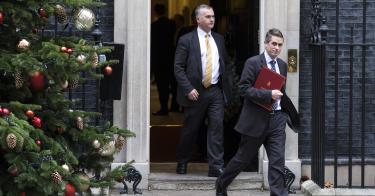What a toxic mix of historical amnesia and political opportunism is being heaped upon Gavin Williamson.
The defense secretary noted that, in the war with Iraq and Syria, the British military may end up killing the enemy—including British ISIS fighters. Apparently, we are to consider that commonsense observation to be outrageous.
“Call for troops to kill U.K. ISIS fighters is illegal and immoral, say critics.” That headline in The Guardian topped a story filled with quotes from human rights lawyers, NGOs, and opposition members of Parliament.
Lord Ken MacDonald called Williamson “juvenile,” and even one of Williamson’s government colleagues just told The Times that the Defense Secretary’s approach was “childish.”
Never mind that International Development Minister Rory Stewart said virtually the same thing in October. Never mind that the British government killed two of its own citizens who were fighting alongside ISIS just two years ago, when Reyaad Khan and Ruhul Amin were targeted in a drone strike in Raqqa.
Let us instead focus on the quality of our other main options for ISIS’ British fighters.
Many still seem not to understand that the United Kingdom’s [U.K.] ability to arrest ISIS fighters abroad is close to zero. The London Metropolitan Police are not going to nip into ISIS-held territory in Syria with a search warrant, handcuffs, and a truncheon and then inform hundreds of terrorist-trained ISIS Brits of their right to remain silent.
Still, any public misunderstanding on this is understandable, as it remains out of the grasp of the leader of Her Majesty’s Opposition.
If the request is that we commit British Army forces into Syria in order to capture these fighters and then house them abroad—possibly in a warzone—until the end of hostilities, that is a reasonable position.
Yet politicians and human rights groups should be explicit that this is their preference and argue that we should be back in the business of wartime detention of the enemy (as we were in Iraq).
Of course, there is no political appetite for taking that course of action.
Still, the reality is that many British citizens fighting for ISIS will make their way back to the U.K. from the battlefields of the Middle East. Unless they are dual nationals, it would be illegal to strip them of their citizenship and make them stateless.
This leaves prosecution as the preferred option—and that presents a very significant challenge.
No Brit who fought alongside Islamists in Bosnia, Afghanistan, Chechnya, Somalia, or Yemen was ever prosecuted in a U.K. court. Even now, actual examples from Iraq or Syria are very thin.
We may think the stories of men like Shabazz Suleman—who says he often spent his time with ISIS “playing PlayStation or going around on bike rides”—are ludicrous. But if Suleman returns to the U.K., it would be very difficult to prove that he committed an act of terrorism that would lead to him being locked him up for any serious length of time.
Other countries face the same problem. A returnee called Harry Sarfo was seemingly filmed gunning people down on the streets of Palmyra and still managed to avoid prosecution back in Germany.
The reality is that many ISIS returnees will go onto the pile with the 23,000 other terror suspects already residing in the U.K. We just hope that MI5 are tracking the most dangerous ones.
If ever a year demonstrated that they cannot get it right the whole time, it would be this one.
Yet, for the time being, many of the U.K.’s opinion leaders seem to have adopted the unusual position that letting ISIS’ army into the U.K. and hoping for the best is the intellectually acceptable option and killing our enemy the juvenile one.
Perhaps this view will last. Perhaps not. After all, if the French or Belgian governments had displayed some of Williamson’s “childish” preferences to their citizens who had traveled to Syria, Abdelhamid Abaaoud might well be dead and 130 people unfortunate enough to be in Paris on Nov. 13, 2015 might be alive.
Still, I hope a sneer and a couple of days’ worth of headlines was worth it for Williamson’s critics. Because the next time body parts are scattered over the tube or concert venues, and families are trying to rebuild their shattered lives after the loss of loved ones, the headlines may not be quite as favorable.
This piece originally appeared in The Daily Signal



